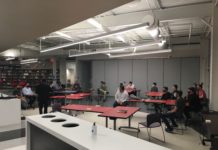It started as a typical Thursday afternoon at the produce store. As you may know, shopping with kids is always an adventure, from the moment you walk through the sliding glass doors. One child immediately hung on the cart, while the others found excitement in weighing the vegetables and taking in the tantalizing smells and textures. Another stayed by my side as we dutifully filled our bags and crossed off our list.
My youngest was tugging on my skirt, trying to get my attention. He was pointing to a man shopping further down the aisle with a deformity on his face.
I noticed my other kids briefly glance and look away. I made a mental note to talk to my children in the car, to explain to them that there are many types of people in the world, all precious, all unique in their own way. It was going to be a learning moment—one that I hoped would affect them forever. I prayed that I would say the right words, a powerful message that would touch them and make a profound impact.
It was hard to concentrate on the rest of the groceries. Words were spinning in my head, like a wheel of anxiety.
We buckled our seatbelts, and just as I was going to open my mouth, my 13-year-old son began to speak. “Mommy, I have something to share with everyone,” he began. “You know that man in the aisle? When I saw him, it made me remember a special person that I know.”
I was intrigued. I know his friends in school; none looked like the man in the grocery store.
“In Camp Simcha,” he continued, referring to the wonderful summer camp for children with severe illnesses that he had attended for the past few summers, “there is a man who looks the same. He has skin cancer, and it changed his face. He is a wonderful person, one of the kindest people that I know, and I miss him.
“So never judge anyone,” he told his siblings. “You don’t know where they have been, and what they may have suffered. You may think that you understand, but you don’t. Before you assume anything, be sure to learn the facts.”
I felt hot tears on my cheeks, and suddenly I felt exhausted and desperate to be alone. I needed time to absorb the message that my son was teaching my children and me. Of course, he understands. He’s heard it again and again during the past few years while he’s been in treatment himself. Although his outward appearance is (thank G‑d) the same, he is keenly aware of the whispers in the room that he’s the kid with cancer. His compassion and honesty filled my heart with an emotion that only a mother can feel.
My son often tells me of his friends who are missing an arm or a leg, have become blind, or suffered dearly in ways we can’t imagine as a result of their cancer treatments. If the kids in Camp Simcha can look at their friends and see past their outward appearance, I certainly can give it my best shot.
We are in the month of Elul, a time of repentance for the upcoming High Holidays of Rosh Hashanah and Yom Kippur. Elul is a time to draw close to G‑d in preparation for the Day of Judgment. These are days of awe, days of introspection, and perhaps even days of trepidation, in anticipation of the new year.
During Elul, I try to think of something that I can work on for the coming year, a realistic and achievable goal.
This year it’s obvious. Don’t judge. You may know a name, you may even live nearby, but you may not know the story.
The following is an excerpt from a letter written by the Lubavitcher Rebbe, of righteous memory:
Judging by your writing, I assume you know of the saying of our sages that one should not be hasty in judgment, and if a judgment is made, it should be made on the scale of merit. If you will talk to those whom you like, they will surely help you to dispel any suspicions in regard to those with whom you are not satisfied.1
We hear it all the time: don’t judge others. It’s easier to relate to not judging people based on their outward appearance. However, when we perceive the moral failings of our friends and neighbors, our sages demand that we judge them favorably, always giving them the benefit of the doubt. Although it’s not easy, this is a goal worth striving for. I am ready for the challenge.
Our trip to the produce store “bore fruit,” a rare, transformative moment of learning that we can bring into Elul as we prepare ourselves for Rosh Hashanah and a year of goodness and blessing.
Reprinted with Permission from Chabad.org






